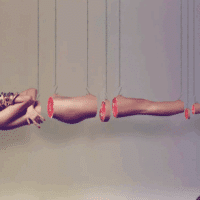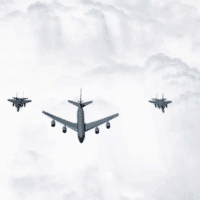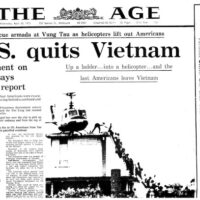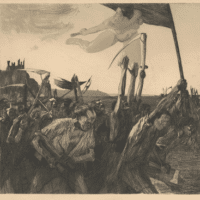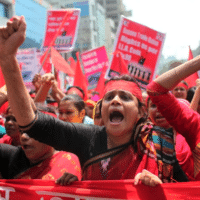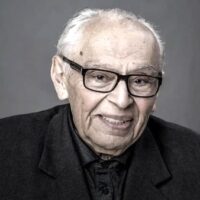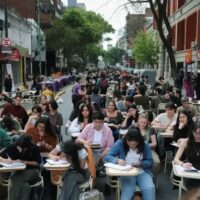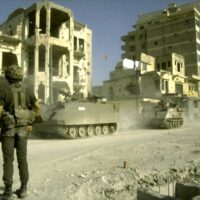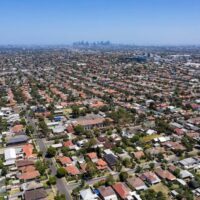-
The everyday horror of modern sexism
Women are conditioned to accept sexism, but they are also able to rebel against it in the right circumstances.
-
Workers’ revolution in Portugal, 1974-5
The country’s ruling class had operated for centuries by pillaging its colonies while neglecting to build much industry at home. Portugal was the least developed country in Western Europe; 37 percent of the population couldn’t read or write.
-
World military spending explodes
Every dollar added to the world’s military budgets takes us closer to a potentially apocalyptic scenario of world war.
-
Vietnam: A victory never to be forgotten
It’s a historic anniversary that the U.S. ruling class and its allies around the world wish we would forget.
-
Letter from a Palestinian political prisoner in Louisiana
Authorities arrested and are attempting to deport Khalil, a permanent resident of the United States and prominent figure in last year’s Columbia’s Gaza solidarity encampment.
-
16th century revolutionary’s words resonate today: Review of new book on Thomas Muntzer
Andrew Drummond’s marvellous new book, The Dreadful History and Judgement of God on Thomas Muntzer: The life and times of an early German Revolutionary, published by Verso, is “the definitive” biography of the sixteenth century revolutionary, in the words of one Marxist historian.
-
Capitalism can’t end women’s oppression: We need a revolution
Fifty years ago, the UN designated 1975 as the International Year of Women.
-
Resisting the right-wing vibe shift
The hard right is making serious ground globally. But, while increasingly powerful, their ideas are not hegemonic. Now is not the time to despair, but to fight for a better world.
-
On the fall of France’s government
Under the presidency of Emmanuel Macron, the expected lifespan of a prime minister has gone from three years to three months. Michel Barnier, the latest PM to fall victim to the rolling political, social and constitutional crisis that is the Macron presidency, was appointed in September and kicked out in time to spend Christmas with his family. His predecessor, Gabriel Attal, lasted a comparatively Methuselean six months.
-
Gustavo Gutiérrez’s revolutionary mission
On 22 October, at the age of 96, one of the key figures of liberation theology passed away.
-
Inside Argentina’s university occupations
Students are occupying more than 70 different faculties of 30 public universities across Argentina.
-
Israel’s history of aggression against Lebanon
Israel’s latest murderous assault on Lebanon is part of a recurring pattern of imperialist aggression.
-
How U.S. union leaders worked with the CIA to undermine democracy
Soon after Israel launched its genocidal war in Gaza with the full support of the U.S. government, opposition emerged to the Biden administration in a place that many professional political commentators found confounding: within U.S. trade unions.
-
Karl Marx: More than an economist
In his lifetime, Karl Marx witnessed the establishment of capitalism as an all-encompassing, global system, and with it the international working class—a force capable of radical social transformation.
-
How a giant corporate cover-up poisoned the planet—and everyone on it
In 1998, the head toxicologist at 3M estimated that a safe level of PFAS in human blood is about one part per billion. The average American’s blood has not double, not triple, but 30 times that amount.
-
Cities must be adapted for climate change
In the past few years, whole towns have been wiped out by fire and flood, suburbs have been inundated by floodwaters or storm surges in Sydney and Melbourne, and extreme heat is putting more people in hospitals.
-
The billionaire ‘nepo baby’ boom
In every country and culture, capitalism depends on an ideological mirage of equal opportunity and reward for effort, to conceal, as much as possible, the reality of brutal exploitation and inequality.
-
What Julian Assange taught us about empire
The truth, it turns out, won’t set you free: under capitalism it can get you locked up. That’s what Julian Assange discovered when he spoke truth to power.
-
Billionaires go bunkers
The year is 2070. A global catastrophe—climate change, nuclear winter, civil war: pick your poison—recently ended civilisation and opened a new chapter in your life.
-
Lenin in his own words: five key texts
Vladimir Lenin, leader of the 1917 Russian Revolution, is one of history’s most well-known figures, and one of its most maligned. Mainstream culture vilifies him as a despot.

